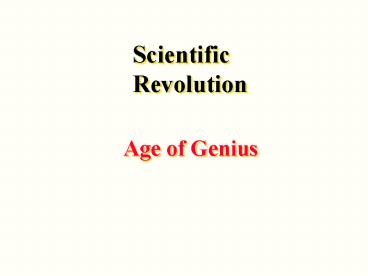Scientific Revolution PowerPoint PPT Presentation
1 / 17
Title: Scientific Revolution
1
Scientific Revolution
Age of Genius
2
Reasons for the Change
- Foremost change in world view travel - Chinese
calendars disprove the flood - Modern science - experimental observations and
mathematics - Had always been subordinate to theology
- Astrology and physics led the way
- Traditional views were based on a) Aristotelian
mechanicsb) Ptolemaic astronomy
3
Traditional Ideas
- Common sense proved Aristotle correct - earth
stood at the center of the universe - Aristotles ideas were accepted for 2,000 years
because 1) he offered common sense explanations,
2) pacified religion - Great chain of being - Inanimate objects - lowest level -
liquidsvegetable class - life and existencedumb
animals - feeling and lifeman - intelligence and
soulspiritual world - angels
4
- In humans there were 4 humorsa) melancholyb)
phlegmc) bloodd) choler - They passed through the veins from the liver to
the heart - good life needed harmony
5
Copernicus
- Polish clergyman
- Astronomer based his research on Ptolemy
- Heliocentric theory - On the Revolution of the
Heavenly Spheres (1543) - Where was God?
- Calvin it cannot be moved
- Luther called him a fool
- Catholic reaction was milder, 1616 denounced his
theories
6
Copernician Theory
- The universe was staggering
- The stars are at rest
- Earth was just another planet
7
- Son of a Danish nobleman
- Agreed with Copernicus
- Studied the stars for 20 years
- But believed the sun was the center of the
universe and earth remained stationary
Brahe
8
- German
- Mathematician
- Had been Brahes assistant
- 3 laws of motion
Kepler
9
Galileo
- Italian
- Mathematician
- Conducted experiments to prove what would
actually happen. - Designed a telescope to see the universe
- Formulated the law of inertia - objects are in
continual motion - Also worked with gravity
10
- Worked for the Medicis of Tuscany
- Pope Urban VIII allowed him to write on worldly
system but he could not judge which one actually
existed - Dialogue on the Two Chief Systems of the World
(1632) - In 1633 at 68 he was tried for heresy by the
Inquisition - Facing death he recanted, but his books
circulated throughout Europe - Religion vs Science
11
Isaac Newton
- English genius, intensely religious
- Mathematician
- Mathematical Principles of Natural Philosophy
(1687) - Principia was the synthesis of the revolution
- The law of gravity
- Universe one system
12
Newtons Laws
- 1) a body remains at rest or motion unless acted
upon by another source - 2) changes in motion are proportional to the
energy exerted upon the object - 3) to every action there is an equal and opposite
reaction - If I have seen further than others it is by
standing on the shoulders of giants
13
Francis Bacon
- English politician, attorney, and writer
- Attacked the reverence to ancient thinkers
- Developed the theory of empiricism(study as much
as possible, compare and analyze before making
speculations) - Empirical knowledge would make nations rich and
powerful
14
- 1620 wrote Novum Organum (new method of acquiring
knowledge - Generalizations can only be made by inductive
reasoning - Inductive reasoning - move from the particular to
the general
15
René Descartes
- Promoted deductive reasoning
- Reason out a general law and then apply it
broadly to all cases - Reduced all matter to spiritual and physical
-Cartesian Dualism - Doubted all that could be doubted excepted his
own existence - cogito ergo sum
- Also developed analytical geometry
16
Causes of the Revolution
- Medieval philosophy separated from religion
- Universities established departments of
astronomy, mathematics, and physics - Renaissance thinkers recovered many of the
classical thinkers - Patronage
- Better instruments
- Reason
17
- Royal Society of London created in 1662 by
Charles II - French Royal Academy of Science in 1666 by
Colbert for Louis XIV - Absolute monarchs used science to gain economic
and military advantages - Protestant countries gained a huge advantage
- Church power greatly reduced never to be as
powerful

